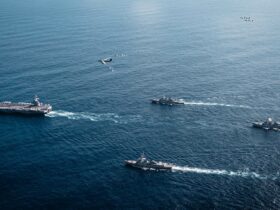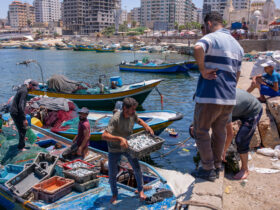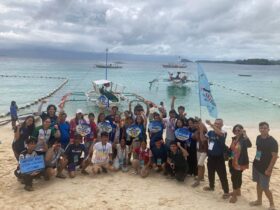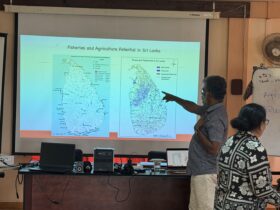The Lombok Statement, made at: ICSF Workshop on ‘Customary institutions in Indonesia: Do they have a role in fisheries and coastal area management’, 2-5 August, Lombok.
Indonesia is an archipelago with deep historical roots in its maritime affairs and fisheries. The sea is seen by traditional fishing communities not just as a means of livelihood but as a way of life that accommodates the whole social arrangement of the society, its ethics and morals.
WE, representatives of adat law communities, traditional fishermen, coastal communities, women in fisheries, environmental and other civil society organizations, and academe, who attended the workshop on “Customary Institutions in Indonesia: Do They Have A Role In Fisheries and Coastal Area Management?” from 2 – 5 August 2009, in Lombok, West Nusa Tenggara, Indonesia, believe that adat law and traditional knowledge make significant contributions to the protection of marine and coastal ecosystems, and the sustainability of marine and fisheries resources, as well as environmental sustainability.
WE have demonstrated that adat law, in existence since the 16th century, and traditional knowledge can make a significant contribution towards providing a just and sustainable marine and fisheries resources management regime. We believe that strengthening the social and cultural capital of adat law communities, traditional fishermen, women in fisheries, and coastal communities can assist in managing marine and fisheries resources, and be instrumental in addressing the multi-dimensional crisis currently faced by fisheries, and marine and coastal ecosystems.
WE believe that marine and coastal resources management regimes should uphold environmental sustainability and social justice and gender equality, especially of marginalized members of coastal communities, including poor widows, neglected children, the disabled and the permanently ill.
WE have discussed the root causes that adversely impact the livelihood of adat law communities, traditional fishermen and coastal communities. We have united and corroborate our voices to:
First, reversing the practice of privatization, monopolization and liberalization of marine and coastal resources, as, for example, in provisions contained in Law No. 27, 2007, on Coastal Area and Small Islands Management, especially the provisions regarding the issue of Coastal Waters Utilization License (Hak Pengusahaan Perairan Pesisir – HP3), as well as Regulation No. 5 of 2008 issued by the Minister of Marine Affairs and Fisheries, which has now been revised and reissued as Regulation No. 12 of 2009, on Capture Fisheries, especially its provisions for Cluster Fisheries. It is better to grant priority to the Constitutional rights of adat law communities and to harmonize them with the universal principles guaranteed in the 1945 Constitution, the Universal Declaration of Human Rights, the International Covenant on Civil and Political Rights, the International Covenant on Economic, Social and Cultural Rights, and the United Nations Declaration on the Rights of Indigenous Peoples, as well as Law No. 39, 2009, on Human Rights.
Second, in urging prioritization of the interests of adat law institutions above the interests of investors and international conservation organizations, through the creation of an Adat Institution Communication Forum.
In this context, we are seeking strengthening of adat law institutions, especially through constitutional recognition of the adat law institutions in marine and fisheries resources management, and through undertaking documentation and giving due publicity to adapt law institutions.
By strengthening of the adat institutions, we imply that the State should:
- Acknowledge and protect adat law and traditional knowledge that have been handed down from generation to generation, have become part of our nation’s cultural identity and have helped in conserving and managing marine and fisheries resources. This can be achieved by recognizing and integrating adat law and traditional knowledge into the national legal system, giving due consideration to diversity of value systems, national unity and gender equality.
- Grant greater preference to sustainability of coastal and fisheries resources, and to the growing domestic fish consumption needs.
- Adopt an economic paradigm that prioritizes the principles of social justice and environmental sustainability over economic growth; that effectively prevents environmental violations in relation to marine affairs and fisheries, especially from illegal, unreported, and unregulated (IUU) fishing; extractive activities; and various policies at local, provincial, and national levels that threaten the marine ecosystem and the sustainability of living resources.
- Last but not least, we invite all members of society, the government, and the international community to lend political recognition to the model of an economy based on the needs of the people, built upon adapt law arrangements and traditional knowledge that uphold the principles of social justice, equality and environmental sustainability.
This Statement is hereby endorsed by:
- Panglima Laot Aceh
- Sasi Negeri Haruku, Central Maluku
- Sea-farmingof Thousand Islands (Kepulauan Seribu)
- Ola Nua Lefa Hari, Lamalera, East Nusa Tenggara
- Parompong Pulau Barrangcakdi, South Sulawesi
- Mane’e Pulau Kakorotan, North Sulawesi
- Taluak Impian Women Fisheries Group, Lake Maninjau, West Sumatra
- Mina Bada Lestari, Lake Maninjau, West Sumatra
- KIARA (Koalisi Rakyat untuk Keadilan Perikanan – People’s Coalition for Fisheries Justice)
- KPPL (Komite Pengelolaan Perikanan Laut – Marine Fisheries Management Committee), East Lombok
- LMNLU (Lembaga Musyawarah Nelayan Lombok Utara — North Lombok Fishermen Forum Institution)
- KNTI (Kesatuan Nelayan Tradisional Indonesia – Indonesian Traditional Fishermen Unity)
- SNI (Serikat Nelayan Indonesia – Indonesian Fishermen’s Union)
- SNSU (Sarekat Nelayan Sumatera Utara – North Sumatra Fishermen’s Union)
- WALHI (Wahana Lingkungan Hidup Indonesia – Friends of the Earth Indonesia)
- Centre for Legal Research of Coastal and Marine Resources Management, Faculty of Law, Pattimura University
- Social Division, Lab. SEPK, Faculty of Fisheries and Marine Sciences, Brawijaya University, Malang
- JALA (Jaringan Advokasi untuk Nelayan Sumatera Utara – Advocacy Network for North Sumatra Fishermen)
- Bina Desa Jakarta
- Fishermen of Negeri Ouw, Saparua, Central Maluku
- East Lombok Marine and Fisheries Committee
The Workshop was also attended by representatives from:
- International Collective in Support of Fishworkers (ICSF),
- Sustainable Development Foundation (SDF), Thailand
- Sahabat Alam Malaysia (SAM)
- Jaringan Orang Asal Se-Malaysia (JOAS)
- CBCRM Learning Centre Philippines
- YADFON Foundation, Thailand
- Penang Inshore Fishermen Welfare Association (PIFWA), Malaysia
- Lanao Aquatic and Marine Fisheries Center for Community Development (LAFCCOD), Philippines
- Integrated Rural Development Foundation of the Philippines (IRDF) Inc.
- Centre for Limnology Research (LIPI)
- Centre for Coastal and Marine Research (Pusat Penelitian Pesisir dan Laut – P3L), Mataram University





Leave a Reply